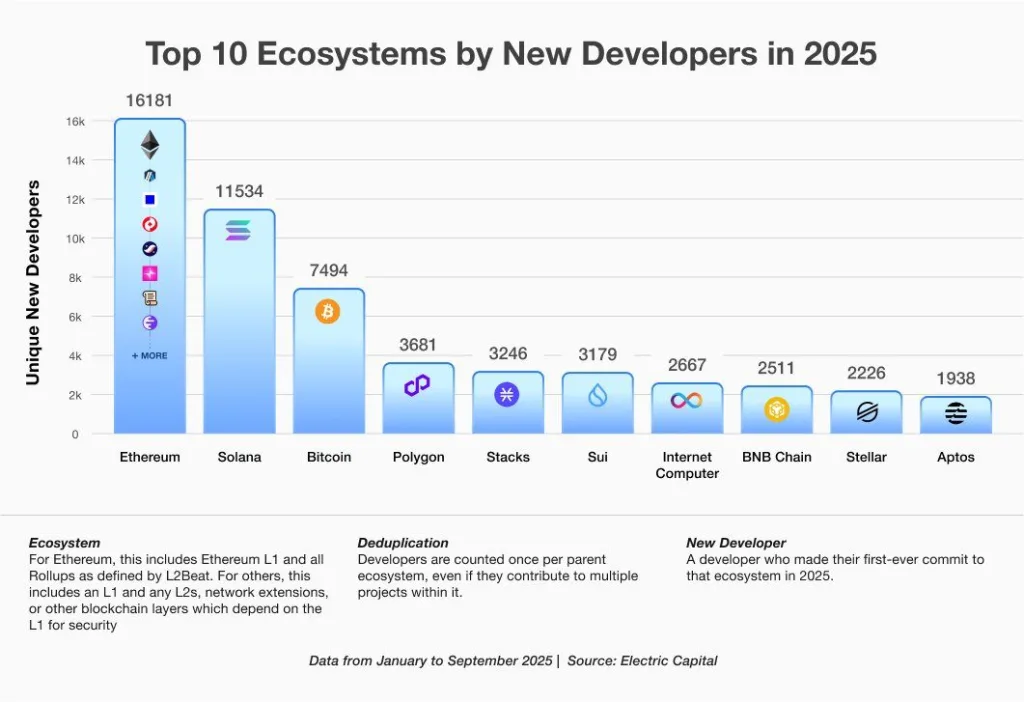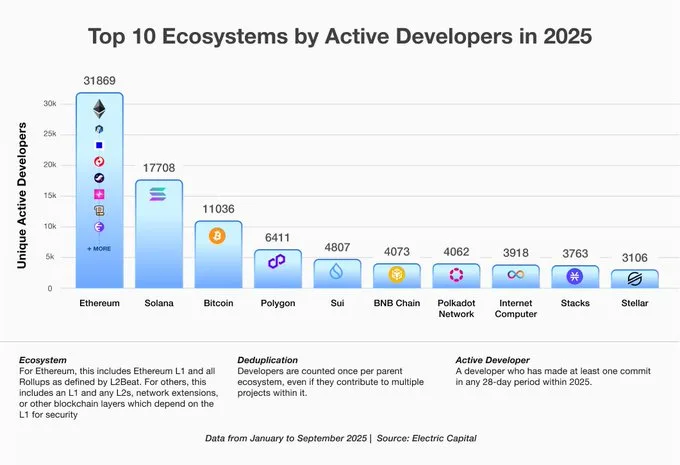Ethereum Leads in Developers, Solana Dominates Momentum

- Ethereum added 16,181 new developers in 2025, leading in total developer count globally.
- Solana now has 17,708 active developers, showing strong growth in blockchain engagement.
- ETH’s developer retention faces challenges, with many receiving higher-paying job offers.
Ethereum has seen a remarkable surge in developer growth in 2025, adding 16,181 new developers between January and September. Despite Ethereum’s success, Solana has garnered more attention as the blockchain industry’s most popular ecosystem. According to Electric Capital, this has led to a gap in perception, with Ethereum leading in numbers but Solana dominating the narrative.

The Ethereum Foundation confirmed that it would remain the top ecosystem for new developers in 2025, with a total of 31,869 active developers. This figure is nearly double the number of active developers on Solana, which stands at 17,708. Ethereum’s strong presence in developer activity contrasts with Solana’s explosive growth.

Solana Surges Ahead in Developer Growth, Ethereum Maintains Lead
Solana added 11,534 new developers, increasing its year-over-year growth in the developer count by 83%. Bitcoin, while still a dominant force in the crypto market, ranks third in new developer additions. The network welcomed 7,494 new developers, bringing its total to 11,036 active contributors. This puts Bitcoin well behind Ethereum and Solana in terms of developer engagement, though it remains a critical player in the blockchain ecosystem.
While Ethereum leads in the number of developers, compensation remains a key issue. Ethereum core developers earn a median salary of $140,000, which is significantly lower than the industry average of $359,000.
Ethereum’s Global Reach and Developer Retention Struggles
The effect of Ethereum is global as it reaches the top in developer activity levels across all continents. The developers are now based primarily in Asia, with their numbers having exceeded those in North America. India, likewise, had the greatest number of new developers enter crypto in 2024.
Electric Capital’s 2024 report points out that one in three crypto developers today code across multiple blockchains. This is up from less than 10% in 2015. Multi-chain development in Ethereum has continued to dominate activity, with 42% of new code added across the entire ecosystem.
Related: Ethereum Foundation Prioritizes Interoperability to Enhance UX
However, Ethereum faces challenges in retaining its developers. Protocol Guild has given away more than $33 million since May 2022, but the median annual developer salary is still below market at $67,121. Almost 40 percent of those who work on the core of Ethereum have, in one way or another, been courted by competing networks over the year.
Meanwhile, Ethereum remains the dominant blockchain in Latin America. According to research by Sherlock Communications, Ethereum represented more than 75% of blockchain activity in the area between June 2024 and June 2025.
The crypto job market has seen salary cuts across most roles in 2024-2025, with entry-level positions being the hardest hit. Meanwhile, executive compensation has soared, and international engineers in the U.S. are now paid more than their U.S. counterparts for the first time ever
The shift toward global hiring is picking up even more speed. 81% of companies have adopted a global-first hiring strategy, and the share of developer activity in Asia has almost doubled. This expansion underscores the increasing importance of Asia in determining the configuration of the blockchain and crypto ecosystem, where remote work prevails.




